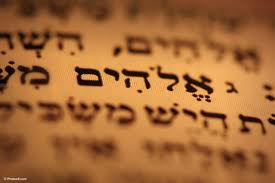Elohim . . . Plural or Singular?!
 Ever since my Seminary days, first in Moscow, Russia and then in Washington, DC and Berrien Springs, Michigan, I was always taught that the Doctrine of Trinity is the most profound and inexplicable of all the Church Dogmas. Eventually I came to see it as the most foundational of all the Christian beliefs. For if you take it away, the entire theological structure of Christendom collapses in an instant. Ever since my Seminary days, first in Moscow, Russia and then in Washington, DC and Berrien Springs, Michigan, I was always taught that the Doctrine of Trinity is the most profound and inexplicable of all the Church Dogmas. Eventually I came to see it as the most foundational of all the Christian beliefs. For if you take it away, the entire theological structure of Christendom collapses in an instant.
If the Doctrine of Trinity is not biblical and, therefore, not factual, then Jesus Christ is not some Second Person of the Divine Trio! With the Trinity exposed as an ancient pagan deity, the Church is revealed as just another idolatrous cult in the sea of human polytheism! I was very surprised and quite shocked, therefore, when I began discovering that what the Church had taught me for many years about their “triune” god was no more than a fabricated lie!
It is an undeniable fact that even the New Testament does not support the Church’s Dogma of the “Most Blessed Trinity.” Apart from a few passages, inserted into it by zealous Trinitarians in the early centuries of Common Era (CE), there is nothing in the original text to support the Doctrine. We encourage you to examine the evidence presented to that effect in our reflections on Matthew 28:19 and I John 5:7-8. You will be able to see that these passages are mere interpolations into the Greek text, inserted there to back up the then emerging Doctrine of the tri-headed god!
But even if one were to persist in his beliefs that the New Testament espouses the doctrine of a three-partite god of Christendom, the burden of proof should be supplied not from the pages of the Greek-speaking New Testament but rather from the words of the Hebrew Scriptures! When confronted with this truism, my Christian friends begin frantically to seek for such proofs in the “Old Testament.”
Unfortunately, they approach the Word of God with a predetermined agenda, seeking to conform the Bible to their established beliefs. As a result, they usually “find” what they are looking for! Their finds, however, are due to the ignorance of the original Hebrew text and their desperate desire to substantiate their misguided faith!
Today, we start a series of lectures designed to disabuse our Christian friends of both their ignorance of the Word of God and their idolatrous beliefs in the pagan three-faced deity of Trinity! If we succeed in making them pause and think biblically for at least one moment, we will consider our mission a success! If they choose to leave the idol-worshiping fold of Christianity and convert to the truth of One God of Israel, - our labors will have eternal results indeed!
Elohim and His Verbs
 One of the most often-cited “trinitarian proofs” from the Hebrew Scriptures is found by our Christian collocutors in the Book of Genesis, chapter 1: “In the beginning God created the heavens and the earth. . .” (v.1) – The Hebrew word for “God” in this text is “Elohim,” which, according to the common usage of the Hebrew Tongue, may seem to have a plural connotation. One of the most often-cited “trinitarian proofs” from the Hebrew Scriptures is found by our Christian collocutors in the Book of Genesis, chapter 1: “In the beginning God created the heavens and the earth. . .” (v.1) – The Hebrew word for “God” in this text is “Elohim,” which, according to the common usage of the Hebrew Tongue, may seem to have a plural connotation.
With a note of scholarly triumph in their voices, (after all, they have just discovered the Hebrew word for “God”), our “learned” opponents declare that the very first verse in the entire Bible speaks of God as if He were some “compounded unity” or “plurality of persons” as they call it! Is that really the case?
Our erudite Christian debaters forget that even the English language has words that are plural in their grammatical forms while singular in their number!
Examples:
-What's the news?- Mathematics was never easy for Tom.- Rhetorics was one of the seven free arts.- Shingles is caused by the same virus as chicken pox.- Billiards is a game which connects mathematics and football.
So, a brief note on English grammar is in order at this point. Unlike many other world languages, English is a very misleading tongue when it comes to the nuances of gender and number in the speech. In the English language, for example, there is no difference between: he created; she created; it created; we created; you created; or even they created. In other words, in many cases, English verbs do not differentiate among the gender and number of their subjects. That is why, perhaps, English has been such a powerful vehicle for transmitting many unbiblical falsehoods and have lent itself so well to feminist, gay-right and other gender-bending movements! But that is beside the point!
The Holy Tongue of Hebrew, on the other hand, is very specific about the gender and number of the subjects that perform any given action! It is also important to understand that the Hebrew Language is the one of action. What I mean by that is that Hebrew is driven primarily not by nouns, or any other part of speech, for that matter, but rather by its verbs! Verbs in the Hebrew Tongue conjugate according to the number, (singular or plural), and gender, (masculine or feminine), of their respective subjects!
Thus, our Genesis example above reads in Hebrew: “In the beginning Elohim He created. . .” The Hebrew word for “created,” “bara” is in a masculine singular conjunction, which rules out completely any plurality within the Subject Elohim! If the Subject Elohim were plural, the verb conjugation would have reflected that plurality in its ending! If it were feminine, - the verb would have reflected that as well! As you can see, the grammar of the language is very unequivocal and does not allow for fanciful Trinitarian explanations to slip into it! Praise Elohim for the Hebrew Tongue, beloved!
In fact, the first chapter of Genesis is replete with verbal actions of our Creator! It speaks of God who: “created, said, made, divided, called, saw, set, blessed, etc.” Every single one of these Hebrew verbs is in a masculine singular conjunction! None of the verbs that describe God as their Subject has any indication that there might be some plurality within our Elohim! You see, my friends, ignorance is a dangerous thing and may well take us away from the Living God and into some idolatrous religions such as Christianity, for example!
Elohim and His Pronouns
 Even when it comes to personal pronouns, words such as “you, he, she, it, they, we, etc,” English is a quite impoverished language! All of us are well aware that English does not differentiate between “you” as a singular individual, “you” as someone’s superior and “you” as a group of people! Most other developed languages have all these distinctions in their arsenal. German, for example, has all three categories. The same is true for Hebrew! Let me adduce a couple of biblical examples to elucidate this point. Even when it comes to personal pronouns, words such as “you, he, she, it, they, we, etc,” English is a quite impoverished language! All of us are well aware that English does not differentiate between “you” as a singular individual, “you” as someone’s superior and “you” as a group of people! Most other developed languages have all these distinctions in their arsenal. German, for example, has all three categories. The same is true for Hebrew! Let me adduce a couple of biblical examples to elucidate this point.
Let us take first the personal pronoun “you.” The text of our Bibles has a few instances, in which a speaker, be he a prophet, psalmist or any other individual, refers to God in a direct way that requires the use of this personal pronoun. In II Samuel 2:28, David is recorded as addressing God with the following words: “And now, O Lord GOD, You are God (Elohim), and Your words are true, and You have promised this goodness to Your servant.”
In English, the phrase “You are God (Elohim)” can easily mean one of the following:
a) God is masculine singular; - You (He) are God;b) God is feminine singular; - You (She) are God;c) God is a group of individuals; - You (Them) are God;
Unfortunately, in English the personal pronoun “you” can mean all of these things. This is not the case in Hebrew or any other precise language!
In Hebrew there are four personal pronouns for the single English “you”:
1) “atah” – “you-he” when addressing a man;2) “at” – “you-she” when addressing a female collocutor;3) “atem” – “you- plural-male” when addressing a group of all males or a mixed company;4) “aten” – “You-plural-female” when addressing an all-female group of people;
As you can see, the Hebrew Tongue is very precise and leaves no grey areas for would-be theologians to hide in! When David says “You are God,” he addresses Him with masculine singular “atah”! The text goes something like this in Hebrew: “And now, my Lord YHVH, You (Atah) - He the Elohim!” The text is absolutely unequivocal as to the number and gender of David’s addressee.
The biblical examples, in which Hebrew grammar, its verbs and personal pronouns testify against the heathen notion of Trinity are too numerous to mention in this article. I think, however, that we have already given our readers enough material to persuade them against that pagan foolishness!
Elohim as a Generic Term for God
 Our understanding of the Hebrew term “Elohim” would not be complete without the knowledge that this particular word is often used in the Hebrew Bible as a generic term for “god.” Quite often the Hebrew Scriptures uses the word “Elohim” the same way that English uses the word “god” when speaking about manifold deities of the world. Our understanding of the Hebrew term “Elohim” would not be complete without the knowledge that this particular word is often used in the Hebrew Bible as a generic term for “god.” Quite often the Hebrew Scriptures uses the word “Elohim” the same way that English uses the word “god” when speaking about manifold deities of the world.
Thus, in English we could say that Buddha is god for many Chinese people, while Allah is god for many Arabs. In this case, the word “god” in English, just as the term “Elohim” in Hebrew is a means of describing a deity or an object of people’s faith and worship. In Exodus 20 we are given the Ten Commandments. The very first of them declares: “I am YHVH, your Elohim . . . you shall have no other Elohim besides Me!”(vv.2,3)
As you can see, both the Living God of Israel, YHVH and His false Gentile counterparts are referred to by means of this generic term “Elohim.” Both instances of “Elohim” in this text are described by the verbs in a masculine singular form, by the way! In the Hebrew Scriptures, it is the context in which this word is found and the grammar of the language (verbs, pronouns, etc) that determine its proper meaning!
Another example is provided by Psalm 96: “All Elohim of other nations are idols, but YHVH has made the heavens!” (v.5) – In cases like this one, Elohim is used as a plural noun, which reinforces the sharp distinction between the Elohim of Israel (YHVH), Who is One and Only and Elohim of Gentiles, who are many (like Trinity)!
In a few instances the word “Elohim” may even denote human beings, who have been designated to act in behalf of God, either as judges or rulers in Israel: Psalm 82:1,6; Exodus 22:9. Only when the term “Elohim” refers to the “gods” of other nations or human beings acting in behalf of the God of Israel, is it paired with a verb in plural. Also, unlike English term “god,” which needs an addition of an “s” to indicate the plural ending, the Hebrew Word “Elohim” can function as either singular or plural without the need to change its form! Once again, its singularity or its plurality is determined by the verbs describing the Subject!
We should know that the Hebrew language has a few words, whose grammatical form has a plural ending “im” but which function either as plural entities or a singular object. These words are: “mayim” – “water”; “shamayim” – “sky”; "panim” – “face,” etc.
Thus, the word “panim,” “face” just as “Elohim,” “God” seems to have a plural ending “im.” Although its ending indicates that it is plural in its grammatical form, we all understand that the face is one in number! Otherwise what Joseph’s brothers said in Genesis 44:26 would have had a comical or bizarre meaning. Speaking about Joseph, the Viceroy of Egypt, they stated: “‘We cannot go down; . . . for we may not see the man’s face unless our youngest brother is with us.’” The word for “face” in this text is “panim.” We understand, however, that Joseph was an ordinary human being with one normal face on his head, don’t we?
However, even this analogy is imperfect. For, unlike the word “panim,” which functions mostly with verbs in plural, the term “Elohim” is always described by a verb in a masculine singular construction, when it refers to the God of Israel!
We should not forget that even the English language has a few words that can function either as plural nouns or be singular in their meaning.
Examples:
- The bicycle is a means of transport. The five human senses are our means of communication with the material world.
- A series of burglaries has been going on around the neighborhood. Which are your favorite TV series?
- A new species of bird has been discovered in Indonesia recently. Since the 17th century more than 500 marine species have become extinct in the US.
Other examples are: aircraft, deer, sheep, carp, pike, salmon, trout *
 Finally, if the LORD God of Israel wanted us to know that He is “made up” of three “co-equal, co-eternal and coexisting persons of Trinity,” would not He have done so in His Word, the Hebrew Scriptures? Quite contrary to that, however, He declares loudly and clearly that He is One. Please, notice that in the following quotations, our God does not say “I am them,” – as would be logical in terms of Trinity, but says instead “I am He” over and over again: Finally, if the LORD God of Israel wanted us to know that He is “made up” of three “co-equal, co-eternal and coexisting persons of Trinity,” would not He have done so in His Word, the Hebrew Scriptures? Quite contrary to that, however, He declares loudly and clearly that He is One. Please, notice that in the following quotations, our God does not say “I am them,” – as would be logical in terms of Trinity, but says instead “I am He” over and over again:
“I, the LORD, am the first; and with the last I am He.’” (Is. 41:4)
“You are My witnesses,” says the LORD, “And My servant whom I have chosen, that you may know and believe Me, and understand that I am He.” (Is. 43:10)
“Indeed before the day was, I am He; and there is no one who can deliver out of My hand.” (Is. 43:13)
“I, even I, am He who blots out your transgressions for My own sake; and I will not remember your sins.” (Is. 43:25)
“Listen to Me, O house of Jacob . . . Even to your old age, I am He . . .” (Is. 46:3,4)
“Listen to Me, O Jacob, and Israel, My called: I am He, I am the First, I am also the Last.” (Is. 48:12)
“I, even I, am He who comforts you. . .” (Is. 51:12)
To sum it all up:
- there is no innate or inherent plurality in the Hebrew word “Elohim”; its usage is determined by the context in which it is found in the text; the “Elohim” of Genesis 1 is a singular masculine noun!
- whether the word “Elohim” is plural or singular is determined by the verbs that drive its actions and pronouns that describe it;
- the verbs used in the Hebrew Scriptures to describe the Elohim of Israel completely rule out the possibility that the God who “created Heavens and Earth,” as we see in the Book of Genesis, is a compounded plurality! The personal pronouns associated with it preclude that pagan notion as well!
- He has always been and will always remain- the Holy One of Israel!
So, how many gods are there in your deity?
------------------------------------------------------------------------------------
* Grammaring.com / A Guide to English Grammar
|